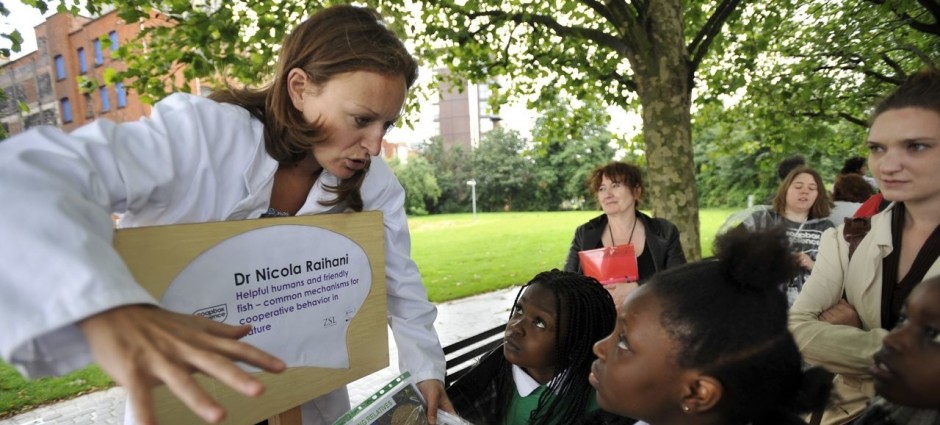 Jane Hill is a professor of ecology at the University of York. She studies the impacts of climate change on biodiversity – including northwards and uphill shifts by species to track climate changes. Habitat loss is preventing many species from shifting their ranges: she studies where and which species will disappear as conditions become unsuitable – and if there is anything we can do about it. She has worked at the University of York since 2001. Her group works mainly on insects, including butterflies, moths, dung beetles and ants.
Jane Hill is a professor of ecology at the University of York. She studies the impacts of climate change on biodiversity – including northwards and uphill shifts by species to track climate changes. Habitat loss is preventing many species from shifting their ranges: she studies where and which species will disappear as conditions become unsuitable – and if there is anything we can do about it. She has worked at the University of York since 2001. Her group works mainly on insects, including butterflies, moths, dung beetles and ants.
Jane and her partner are both academics. Jane tells us how her ‘no limits’ upbringing set her on a path for success, how she and her partner dealt with the ‘two-body’ problem, and how some ‘naming and shaming’ might be the solution to achieving a better gender balance in universities.
SS: Hi Jane, with only 8% of science professors in the UK being female, there are precious few role models for the next generation of female scientists. As one of these role models, can you tell us what was the most important factor in getting you to where you are now?
JH: I went to an all girls school and was taught by female teachers so there were loads of strong female role models and no suggestion that certain topics were off limits to females. I never had a career plan, and there weren’t many jobs for students graduating in the mid 1980s, and so I did an MSc and then a PhD and found myself following an academic route – the research I was doing was so exciting. It was tough being a post-doc for 10 years, moving around a lot, and never in the same place as my partner, who is also an academic. It took until 2002 for us both to secure lectureships at neighbouring Universities where we could live together. I think an important factor was just being pig headed and hanging in there until it all worked out!
SS: You have made it to the top of the career ladder. If you could change one thing about the scientific culture right now, what would it be?
It’s not necessarily just about changing the scientific culture. I think we need to try to change people’s perceptions about what they can achieve and what sort of careers they might choose to follow with a science education. A recent survey of Biology undergraduates at York revealed that even though students thought that males and females were equally good at STEM subjects, only 50% of female students thought males and females had an equal change of a successful career in STEM. So we perhaps need to give our early career scientists (from undergrad upwards), more support and guidance in their career options, to help them make strategic choices at the right time. Mentorship should be better recognized as ‘part of the job’ of an academic/scientist, and provided for all scientists at every stage of their career, to help expand horizons and achieve them. I would also like to see evidence-based initiatives so that new initiatives that are implemented are effective, not just done because they might seem a ‘good thing to do’.
SS: And what about measures to promote equality in science: what is needed to make the scientific community take a step forward in addressing this?
JH: A radical suggestion is to include information about an Institute/ Department’s gender ratio as part of the upcoming government assessment of Universities (Research Excellence Framework (REF)). This might shake things up a bit, and start generating some interesting discussions! Isn’t it time to start naming & shaming…?
SS: We are thrilled to have you as a Soapbox Science Speaker this year, Jane. For most scientists, science outreach always seems to play second fiddle to everything else in academia. You run a very active research group in York, but you also find time to engage in science outreach with exhibitions at the Royal Society, and you regularly give up your time to talk to the press. Surely you’ve ‘ticked the outreach box’! Why take the time to be involved in Soapbox Science?
JH: I’d seen the publicity about it from last year and thought it looked like a fun (and different) thing to do compared with my usual day to day activities. It’s always good to try something new and step out of your comfort zone…hopefully I’ll still feel like that on July 5th!
SS: Soapbox Science is a very different way of communicating science, and throws up challenges that most scientists don’t face in their everyday lives. You are an experienced lecturer and plenary speaker: how do you feel about taking on the public on the 5th July
JH: In a word: OMG! It’s always great to have an opportunity to talk about research but I wonder if people will understand? Will they be interested?
Come and tell Prof Jane Hill how much you understand on 5th July 2013, Gabriel’s Wharf SouthBank, London, where she will be talking about: ”It’s great up north! – species move to track climate warming”. Jane’s participation in Soapbox Science is made possible thanks to sponsorship of L’Oreal For Women in Science, the Zoological Society of London and the British Ecological Society.

JH calls herself ‘pigheaded’, I would say tenacious!